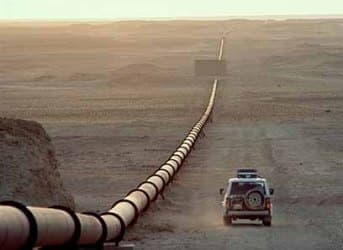As Kurdish authorities in Northern Iraq announce they will begin exporting crude oil by pipeline to Turkey as soon as the last link is finished in September, Gulf Keystone Petroleum launches a new exploration round that could reveal the best resource potential in the region.
UK-based Gulf Keystone Petroleum this week started operations at its Shaikan-7 exploration well in Iraqi Kurdistan, targeting reserves more than 2.5 miles underground.
Drilling for the company’s first deep well will take an estimated 9 months, and there is a lot of optimism for this play. Gulf Keystone thinks it holds up to 10.5 billion barrels of oil and is targeting 2015 for production of 150,000 barrels per day.
Related Article: Kurdistan: Our Pick for the Next Big Buy Out
Kurdistan is already a hot venue, which just keeps getting hotter by the week, with amazing drilling success rates across the board. The territory governed by the Kurdistan Regional Government (KRG) has about 45 billion barrels of proven reserves.
What everyone is waiting on now is the pipeline to Turkey, which can bring Kurdish oil and gas to international markets, bypassing Baghdad.
The last pipeline link, slated to be completed by the end of September, will link up Kurdistan’s fields to the Turkish border at Fishkabour and will have a capacity of 1 million barrels a day by 2015. The country is close to having enough oil to fill that capacity, and more discoveries are coming on line all the time.
For now, the Kurds can only export to Turkey by truck, to the tune of about 30,000 barrels a day. In March this year, the Kurds sold their first crude on international markets, while previously they were trading crude with Turkey in return for refined products for use at home.
Related Article: TURKEY: Erdogan Fails to Regain Control
It was this first international sale that really re-sparked Baghdad’s ire. Baghdad views this as illegal oil and gas activity, but the Kurds—and foreign companies doing business in Northern Iraq—have shrugged off Baghdad’s multiple threats.
The Kurds have the advantage, even more so not that the rest of Iraq is engulfed in a sectarian conflict as it becomes the definitive second front in the war in Syria. Last week, Iraqi Prime Minister Nouri al-Maliki flew to Erbil, the capital of Iraqi Kurdistan, to hold high-level talks. This hasn’t happened since 2003, and it indicates that the talks were on the Kurds’ terms, as well as their terrain.
Will Baghdad be able to stop the Kurdish oil and gas momentum? Not at this point. Once the pipeline is up and running, the game is over and Baghdad doesn’t have the resources to turn it into a conflict.
By. Charles Kennedy of Oilprice.com



















1st the new line connects to the existing northern pipeline that is run by the Oil Ministry in Baghdad.
2nd the connection will be within Iraqi territory not at the Turkish border
3rd this pipeline will still have to deal with central government control since the Oil Ministry runs the main line that the new one will connect to. Second the KRG will still have to deal with payments. How will they be able to distinguish their oil from the oil already flowing through the line from the other northern fields run by the Oil Ministry? HOw will they get paid for this new flow? etc.
4th and most importantly 90% of the KRG budget comes from the national budget. If the central government really wanted to push the Kurds they could cut the budget and strangle Kurdistan financially.
Together that means the main thrust of this article is inaccurate.